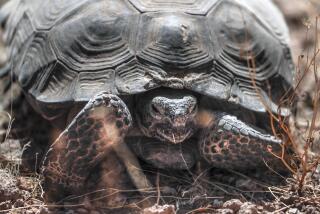Study Gives Army Plans a ‘No Tanks’
- Share via
A U.S. Fish & Wildlife Service report released this week warns that expanding tank training at the Army’s Ft. Irwin in the Mojave Desert could wipe out a population of desert tortoises and harm the last remnants of a rare plant.
Environmentalists immediately hailed the report as a boost in their fight against the expansion of the sprawling base, the Army’s largest training facility.
“The report confirms what we’ve said all along: It’s next to impossible, if not totally impossible, for the base to expand without putting species close to extinction,” said Daniel Patterson, desert ecologist for the Tucson-based Center for Biological Diversity.
Spokeswoman Karen Baker said the Army is reviewing the report and has contracted for its own environmental study, including a census of the tortoise population.
“This is not a document that stops the [expansion] process,” said Baker.
Indeed, the report, labeled preliminary, notes that its conclusions might be modified if new information surfaces about the number of tortoises or the amount of Lane Mountain milk vetch.
It also indicated that final conclusions cannot be reached about the tortoise and the rare milk vetch plant because it is not known exactly where the Army plans to roll its tanks and other heavy vehicles or what mitigation measures the Army is willing to put into place.
Still, the environmentalists hope the report will strengthen their hand in persuading Sen. Dianne Feinstein (D-Calif.) to withdraw her support for expanding the 643,000-acre Ft. Irwin, located north of Barstow in San Bernardino County.
Six months ago, Feinstein and Rep. Jerry Lewis (R-Redlands) announced an expansion for the base, pending an environmental review. The Army says it needs additional space for troops to conduct live-fire exercises in desert warfare.
Feinstein is considered the dominant figure in Congress on matters involving California desert lands. A spokesman for Feinstein said neither she nor her staff has reviewed the 33-page report.
The Fish and Wildlife Service report is part of a planned three-year process of study and consultation between the Department of Interior and the Department of Defense to see if the Army can expand its training site and still comply with the federal Endangered Species Act.
Congressional approval is needed before the 131,000 acres involved in the proposed expansion can be transferred from the Bureau of Land Management to the Department of Defense.
The report said that without substantial protection measures, expansion of the training area could “substantially impair the survival and recovery of the desert tortoise in the western Mojave Desert.” The Fish and Wildlife Service considers the Mojave population of desert tortoises to be “threatened,” one step away from being “endangered.”
The Lane Mountain milk vetch, a wispy herb that often grows inside low bushes, is listed as endangered. The presence of heavy vehicles, troops and dust “would likely jeopardize the continued existence of the Lane Mountain milk vetch,” the report said.
One issue being discussed by the Army and the Fish and Wildlife Service involves the use of billowing smoke during tank exercises. The smoke, often infused with heated mineral oil, is used to mask the presence of tanks from “enemy” ground troops or aircraft.
But Fish and Wildlife biologists are concerned that the smoke can harm the desert tortoise, a species known to suffer from respiratory problems, and hurt desert plants by coating their reproductive parts.
More to Read
Sign up for Essential California
The most important California stories and recommendations in your inbox every morning.
You may occasionally receive promotional content from the Los Angeles Times.













